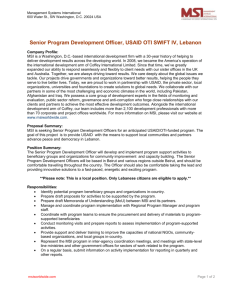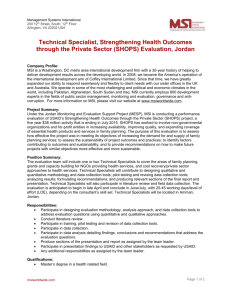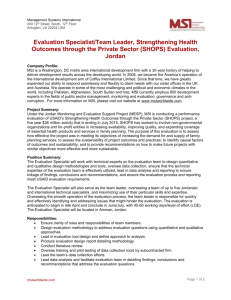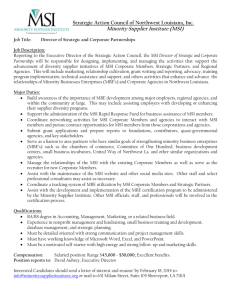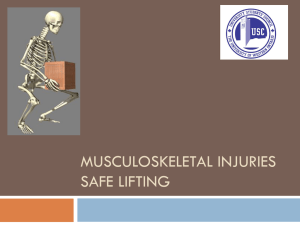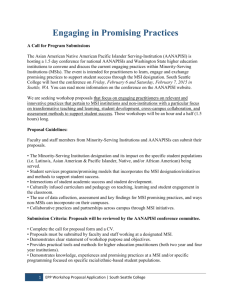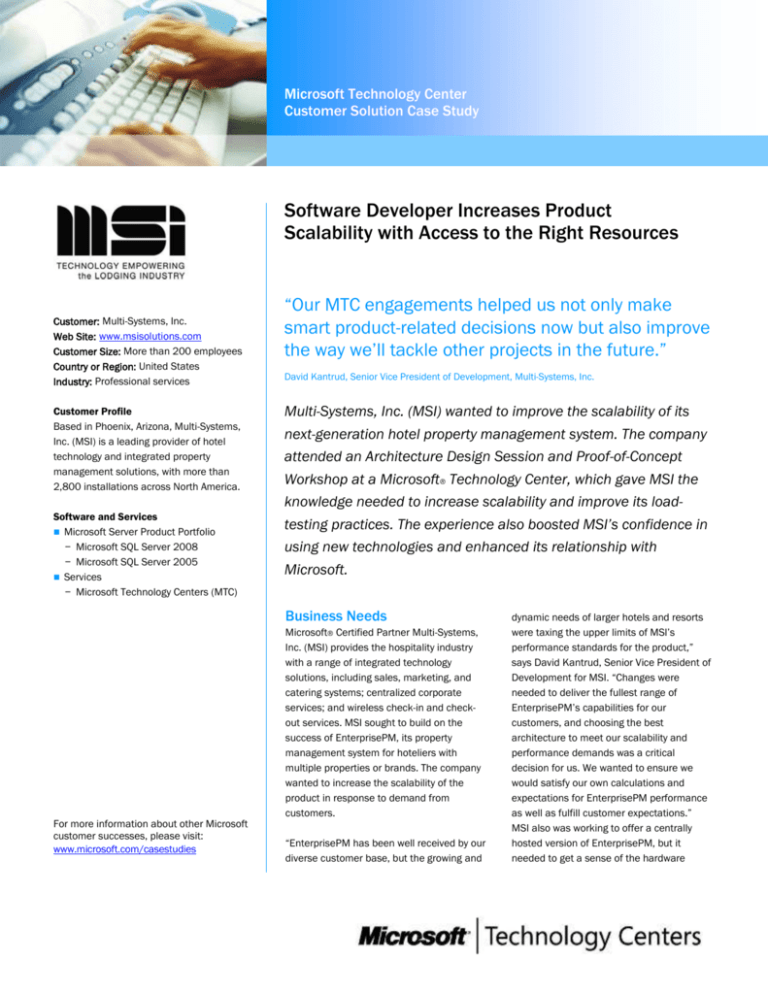
Microsoft Technology Center
Customer Solution Case Study
Software Developer Increases Product
Scalability with Access to the Right Resources
Customer: Multi-Systems, Inc.
Web Site: www.msisolutions.com
Customer Size: More than 200 employees
Country or Region: United States
Industry: Professional services
Customer Profile
Based in Phoenix, Arizona, Multi-Systems,
Inc. (MSI) is a leading provider of hotel
technology and integrated property
management solutions, with more than
2,800 installations across North America.
Software and Services
Microsoft Server Product Portfolio
− Microsoft SQL Server 2008
− Microsoft SQL Server 2005
Services
− Microsoft Technology Centers (MTC)
“Our MTC engagements helped us not only make
smart product-related decisions now but also improve
the way we’ll tackle other projects in the future.”
David Kantrud, Senior Vice President of Development, Multi-Systems, Inc.
Multi-Systems, Inc. (MSI) wanted to improve the scalability of its
next-generation hotel property management system. The company
attended an Architecture Design Session and Proof-of-Concept
Workshop at a Microsoft® Technology Center, which gave MSI the
knowledge needed to increase scalability and improve its loadtesting practices. The experience also boosted MSI’s confidence in
using new technologies and enhanced its relationship with
Microsoft.
Business Needs
For more information about other Microsoft
customer successes, please visit:
www.microsoft.com/casestudies
Microsoft® Certified Partner Multi-Systems,
Inc. (MSI) provides the hospitality industry
with a range of integrated technology
solutions, including sales, marketing, and
catering systems; centralized corporate
services; and wireless check-in and checkout services. MSI sought to build on the
success of EnterprisePM, its property
management system for hoteliers with
multiple properties or brands. The company
wanted to increase the scalability of the
product in response to demand from
customers.
“EnterprisePM has been well received by our
diverse customer base, but the growing and
dynamic needs of larger hotels and resorts
were taxing the upper limits of MSI’s
performance standards for the product,”
says David Kantrud, Senior Vice President of
Development for MSI. “Changes were
needed to deliver the fullest range of
EnterprisePM’s capabilities for our
customers, and choosing the best
architecture to meet our scalability and
performance demands was a critical
decision for us. We wanted to ensure we
would satisfy our own calculations and
expectations for EnterprisePM performance
as well as fulfill customer expectations.”
MSI also was working to offer a centrally
hosted version of EnterprisePM, but it
needed to get a sense of the hardware
requirements for such a model. As the
company began to explore these and other
issues, MSI approached Microsoft."We
wanted to know which hardware
configurations would give us the best
performance,” says Kantrud. “And we also
needed to identify our hardware costs so that
we could appropriately price the product.”
Solution
Microsoft suggested an engagement at a
Microsoft Technology Center (MTC). “I was
extremely enthusiastic at the opportunity to
confer with people who had such a deep
understanding of the technologies that make
our product run,” says Kantrud.
MSI visited the MTC in Irvine, California, in
November 2007 for a one-day Architecture
Design Session (ADS). The three-member MSI
team had an initial conversation with the MTC
architects about the hospitality industry and
its EnterprisePM application. MSI team
members sketched out their architecture
plans for the upgraded and hosted versions of
the product, and the MTC architects
introduced suggestions for improvements
based on industry best practices. “The MTC
architects validated our solution architecture
and also suggested ways to optimize it,” says
Kantrud. For instance, the architects
recommended that MSI implement Web
services to enhance performance and
discussed the best way to share servercomputer resources among separate
customers to maximize server utilization. They
also helped MSI understand the value of
moving from the Microsoft SQL Server® 2005
database software to SQL Server 2008 to
improve its scale.
In January 2008, MSI returned to the Irvine
MTC for a Proof-of-Concept Workshop that
involved ideas from the ADS. The five-member
MSI team included employees from the
company’s development staff, qualityassurance team, and support staff. “We
wanted the people responsible for creating,
testing, and supporting our new hosted
solution to see it in action,” says Kantrud.
MSI worked with MTC architects to
benchmark the solution’s performance as it
supported the simulated daily operations
and peak conditions of a typical large hotel
chain. The team conducted stress tests on a
variety of hardware makes, models, and
configurations to see which combination
best met its needs. MSI found that with the
changes it had made to EnterprisePM,
scalability was even better than it had
hoped, and it released EnterprisePM for
production in February 2008.
Access to resources. MSI benefitted from
its MTC experience because it gained
access to a greater set of hardware
resources. “Working at the MTC gave us a
tremendous opportunity to test multiple
scenarios under a variety of conditions
and configurations,” says Kantrud. “By
validating our capabilities using the MTC’s
vast resources and wide array of
hardware, we can offer our customers
more platform choices and better help
them select the most cost-effective,
proven option for their property.”
Improved technical knowledge. One of the
most helpful elements of the
engagements for MSI was learning more
about load testing. “As a result of working
with the benchmarking tools at the MTC,
we realized there is a ‘bell curve’
distribution of acceptable and usable
performance,” explains Kantrud. “Typically
this means there is a point prior to
complete failure where the product is still
operating, but performance degrades
substantially and is unacceptable to us
and our customers. This knowledge
allowed us to establish more exacting
standards for true scalability rather than
raw functionality.”
Stronger partner relationship. Although
many MSI competitors use non-Microsoft
technologies for their systems, MSI feels
as though the MTC experience reaffirmed
the value of working with Microsoft and its
products. “We saw that Microsoft
technologies are just as scalable as those
from other vendors, and we experienced
firsthand the high level of investment that
Microsoft makes as a company in the
success of its partners,” says Kantrud.
Benefits
MSI used its MTC engagements to improve
the scalability of its product and increase its
testing knowledge, thus providing
applications that better support the needs of
the hospitality industry. “We invest so much
in our products, so we want to ensure that
they’re the best that they can be,” says
Kantrud. “Our MTC engagements helped us
not only make smart product-related
decisions now but also improve the way we’ll
tackle other projects in the future.”
More scalable solution. As a result of the
time spent at the MTC, MSI improved the
scalability of its application and now can
show potential customers real metrics to
support its scalability claims. “We studied
the impact of a new processor and found
that it helped us effectively double the
number of users that EnterprisePM could
support, without compromising
performance,” says Kantrud. “Previously,
we had to extrapolate our scalability limits
from the results of small tests, but now we
© 2008 Microsoft Corporation. All rights reserved. This case study is for informational purposes only.
Document published April 2008
know exactly how much our product can
handle.”

